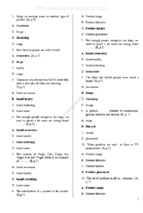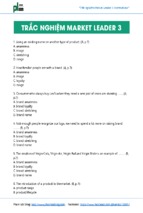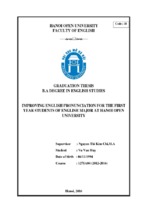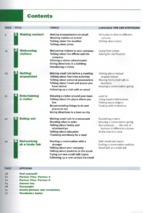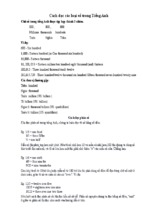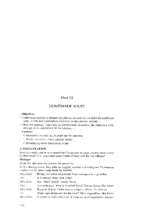DICTIONARY OF
MARKETING
third edition
DICTIONARY OF
MARKETING
third edition
A. Ivanovic MBA
P.H. Collin
BLOOMSBURY
A BLOOMSBURY REFERENCE BOOK
Originally published by Peter Collin Publishing
Third edition published 2003
Second edition published 1996
First edition published 1989
Bloomsbury Publishing Plc
38 Soho Square
London W1D 3HB
© Copyright A. Ivanovic & P H Collin 1989, 1996
This edition © copyright Bloomsbury Publishing Plc 2003
All rights reserved. No part of this publication may be reproduced
in any form or by any means without the permission of the publishers
British Library Cataloguing-in-Publication Data
A catalogue record for this book is available from the British Library
ISBN 0-7475-6621-6
eISBN-13: 978-1-4081-0213-8
Text computer typeset by Bloomsbury Publishing
Printed in Italy by Legoprint
PREFACE TO FIRST EDITION
This dictionary provides the user with a comprehensive vocabulary of terms used in
marketing. It covers such aspects of the subject as market research, advertising,
promotional aids and selling techniques.
The main words are explained in simple English, and, where appropriate, examples
are given to show how the words are used in context. Quotations are also given from
various magazines and journals, which give an idea of how the terms are used in real
life.
The Supplement at the back of the book gives some further information which may
be of use to the user.
We are particularly grateful to Margaret Jull Costa and Stephen Curtis for valuable
comments which they made on the text.
PREFACE TO SECOND EDITION
Business terminology changes rapidly, and this second edition includes a variety of
new terms and expressions which have come into use since the first edition was
published. We have also included new examples and quotations from recent
magazines.
Also included is a pronunciation guide for the main entry words.
PREFACE TO THIRD EDITION
This third edition of the dictionary takes into account the many new terms that have
come into marketing with the growth of e-commerce and the Internet. The
supplement at the back of the book has also been comprehensively updated.
We are grateful to the following for their valuable comments on the text: Ian Linton,
Georgia Hole, Dinah Jackson and Sandra Anderson.
Pronunciation
The following symbols have been used to show the pronunciation of the main words
in the dictionary.
Stress has been indicated by a main stress mark ( � ) and a secondary stress mark
( � ). Note that these are only guides as the stress of the word changes according to
its position in the sentence.
Vowels
Consonants
�
back
b
buck
ɑ�
harm
d
dead
ɒ
stop
ð
other
a
type
d�
jump
aυ
how
f
fare
aə
hire
�
gold
aυə
hour
h
head
ɔ�
course
j
yellow
ɔ
annoy
k
cab
e
head
l
leave
eə
fair
m
mix
e
make
n
nil
eυ
�o
s
save
��
word
ʃ
shop
i�
keep
t
take
i
happy
tʃ
change
ə
about
θ
theft
fit
v
value
ə
near
w
work
u
annual
x
loch
u�
pool
�
measure
υ
book
z
zone
υə
tour
&
shut
ABC method
1
accelerator
A
ABC method /�e bi� �si� �meθəd/
noun a sales method, where the customer’s attention is attracted, the salesperson then shows the benefits of the
product to the customer, and finally
closes the deal. Full form attention,
benefit, close
ABCs
abbr
Circulations
Audit
Bureau
of
above-the-fold /ə�b
v ðə �fəυld/
noun the part of a webpage which is
seen first without having to scroll, and
so is preferred for advertising
above-the-line advertising /ə�b
v
ðə lan ��dvətazŋ/ noun advertising
for which a payment is made and for
which a commission is paid to the advertising agency, e.g. an advertisement
in a magazine or a stand at a trade fair.
Compare below-the-line advertising
(NOTE: as opposed to direct marketing)
absenteeism /��bs(ə)n�ti�z(ə)m/
noun staying away from work for no
good reason 쑗 the rate of absenteeism
or the absenteeism rate always increases in fine weather 쑗 Low productivity is largely due to the high level of
absenteeism. 쑗 Absenteeism is high in
the week before Christmas.
‘…but the reforms still hadn’t fundamentally
changed conditions on the shop floor:
absenteeism was as high as 20% on some days’
[Business Week]
absolute /��bsəlu�t/ adjective complete or total
absolute advantage /��bsəlu�t əd-
�vɑ�ntd�/ noun an advantage enjoyed
by an area of the world which can produce a product more cheaply than other
areas 쑗 For climatic reasons, tropical
countries have an absolute advantage in
that type of production.
absolute cost /��bsəlu�t �kɒst/
noun the actual cost of placing an advertisement in a magazine or other advertising medium
absolute monopoly /��bsəlu�t mə�nɒpəli/ noun a situation where only
one producer or supplier produces or
supplies something 쑗 The company has
an absolute monopoly of imports of
French wine. 쑗 The supplier’s absolute
monopoly of the product meant that customers had to accept his terms.
absorb /əb�zɔ�b/ verb to take in a
small item so as to form part of a larger
one 왍 overheads have absorbed all
our profits all our profits have gone in
paying overhead expenses 왍 to absorb
a loss by a subsidiary to write a subsidiary company’s loss into the group accounts 왍 a business which has been
absorbed by a competitor a small business which has been made part of a
larger one
absorption /əb�zɔ�pʃən/ noun mak-
ing a smaller business part of a larger
one, so that the smaller company in effect no longer exists
absorption costing /əb�zɔ�pʃən
�kɒstŋ/ noun costing a product to include both the direct costs of production
and the indirect overhead costs as well
depreciation /ək�seləretd dpri�ʃ�eʃ(ə)n/ noun a
system of depreciation which reduces
the value of assets at a high rate in the
early years to encourage companies, as a
result of tax advantages, to invest in new
equipment
accelerated
accelerator /ək�seləretə/ noun the
theory that a change in demand for consumer goods will result in a greater
accept
change in demand for the capital goods
used in their production
accept /ək�sept/ verb 1. to take something which is being offered 왍 to accept
delivery of a shipment to take goods
into the warehouse officially when they
are delivered 2. to take something which
is being offered or to say ‘yes’ or to
agree to something 쑗 to accept an offer
of employment 쑗 she accepted the offer
of a job in Australia 쑗 he accepted
£2000 in lieu of notice 3. to agree formally to receive something or to be responsible for something
acceptable /ək�septəb(ə)l/ adjective
which can be accepted 쑗 Both parties
found the offer acceptable. 쑗 The terms
of the contract of employment are not
acceptable to the candidate.
acceptance /ək�septəns/ noun 왍 acceptance of an offer agreeing to an offer 왍 to give an offer a conditional
acceptance to accept an offer provided
that specific things happen or that specific terms apply 왍 we have his letter of
acceptance we have received a letter
from him accepting the offer
acceptance against documents
/ək�septəns ə"enst �dɒkjυmənts/
noun a transaction where the seller takes
charge of the shipping documents for a
consignment of goods when a buyer accepts a bill of exchange 쑗 Acceptance
against documents protects the seller
when sending goods which are not yet
paid for.
acceptance sampling /ək�septəns
�sɑ�mplŋ/ noun testing a small sample
of a batch to see if the whole batch is
good enough to be accepted
accepted bill /ək�septd �bl/ noun a
bill of exchange which has been signed,
and therefore accepted by the buyer
acceptor /ək�septə/ noun a person
who accepts a bill of exchange by signing it, thus making a commitment to pay
it by a specified date
access /��kses/ noun 왍 to have access to something to be able to obtain
or reach something 쑗 She has access to
large amounts of venture capital. 쐽 verb
to call up data which is stored in a computer 쑗 She accessed the address file on
2
account
the computer. 앳 access to the market
1. the legal right to sell in a particular
market 2. the ability to reach a market
by promotion and distribution
Access /��kses/ a credit card system
formerly operated by some British
banks, part of the MasterCard network
accessibility /ək�ses�blti/ noun
the ability of a market to be reached by
promotion and distribution 쑗 There is
much demand in the market, but, because of the great distances involved,
accessibility is a problem. 쑗 We must
analyse the geographical aspects in assessing the market’s accessibility.
access time /��kses tam/ noun the
time taken by a computer to find data
stored in it
accommodation bill /ə�kɒmə�deʃ(ə)n �bl/ noun a bill of exchange
where the person signing (the ‘drawee’)
is helping another company (the
‘drawer’) to raise a loan
account /ə�kaυnt/ noun 1. a record of
financial transactions over a period of
time, such as money paid, received, borrowed or owed 쑗 Please send me your
account or a detailed or an itemized account. 2. (in a shop) an arrangement
which a customer has to buy goods and
pay for them at a later date, usually the
end of the month 쑗 to have an account
or a charge account or a credit account
with Harrods 쑗 Put it on my account or
charge it to my account. 왍 to open an
account (of a customer ) to ask a shop
to supply goods which you will pay for
at a later date 왍 to open an account or
to close an account (of a shop) to start
or to stop supplying a customer on
credit 왍 to settle an account to pay all
the money owed on an account 왍 to stop
an account to stop supplying a customer until payment has been made for
goods supplied 3. 왍 on account as part
of a total bill 왍 to pay money on account to pay to settle part of a bill 왍 advance on account money paid as a part
payment 4. a customer who does a large
amount of business with a firm and has
an account with it 쑗 Smith Brothers is
one of our largest accounts. 쑗 Our sales
people call on their best accounts twice
a month. 5. 왍 to keep the accounts to
.
accountancy
write each sum of money in the account
book 쑗 The bookkeeper’s job is to enter
all the money received in the accounts.
6. STOCK EXCHANGE a period during
which shares are traded for credit, and at
the end of which the shares bought must
be paid for (NOTE: On the London
Stock Exchange, there are twenty-four
accounts during the year, each running
usually for ten working days.) 7. a no-
tice 왍 to take account of inflation or to
take inflation into account to assume
that there will be a specific percentage
of inflation when making calculations 8.
an arrangement which a company has
with an advertising agency, where the
agency deals with all promotion for the
company 쑗 The company has moved its
$3m account to another agency. 쑗 The
small agency lost the account when the
company decided it needed a different
marketing approach. 쑗 Three agencies
were asked to make presentations, as
the company had decided to switch its
account. 쐽 verb 왍 to account for to explain and record a money transaction 쑗
to account for a loss or a discrepancy 쑗
The reps have to account for all their
expenses to the sales manager.
accountancy /ə�kaυntənsi/ noun the
work of an accountant 쑗 They are studying accountancy or They are accountancy students. (NOTE: American
English is accounting in this meaning)
accountant /ə�kaυntənt/ noun 1. a
person who keeps a company’s accounts
쑗 The chief accountant of a manufactur-
ing group. 2. a person who advises a
company on its finances 쑗 I send all my
income tax queries to my accountant. 3.
a person who examines accounts
account book /ə�kaυnt bυk/ noun a
book with printed columns which is
used to record sales and purchases
account director /ə�kaυnt da-
�rektə/ noun a person who works in an
advertising agency and who oversees
various account managers who are each
responsible for specific clients
account executive /ə�kaυnt "-
�zekjυtv/ noun an employee who
looks after customers or who is the link
between customers and the company
3
achiever
handler
/ə�kaυnt
�h�ndlə/, account manager /ə�kaυnt
�m�nd�ə/ noun a person who works in
an advertising agency, and who is responsible for a particular client
account
‘…we have moved the account because we
thought it would be better suited in a smaller
agency’ [Marketing Week]
accounting /ə�kaυntŋ/ noun the
work of recording money paid, received, borrowed or owed 쑗 accounting
methods or accounting procedures 쑗
accounting system 쑗 accounting
machine
‘…applicants will be professionally qualified
and have a degree in Commerce or Accounting’
[Australian Financial Review]
accounts department /ə�kaυnts
d�pɑ�tmənt/ noun a department in a
company which deals with money paid,
received, borrowed or owed
accounts manager /ə�kaυnts
�m�nd�ə/ noun the manager of an accounts department
accounts
payable
/ə�kaυnts
�peəb(ə)l/ noun money owed by a
company
accredited
agent
/ə�kredtd
�ed�ənt/ noun an agent who is appointed by a company to act on its
behalf
accurate /��kjυrət/ adjective correct
쑗 The sales department made an accurate forecast of sales. 쑗 The designers
produced an accurate copy of the plan.
accurate description /��kjυrət d�skrpʃən/ noun an honest and true description of a product or service in an
advertisement or catalogue 쑗 As the advertisement was clearly not an accurate
description of the product, the company
had to pay a fine. 쑗 It is not an accurate
description of the product to state that it
gives out more light than the sun.
accurately /��kjυrətli/ adverb correctly 쑗 The second quarter’s drop in
sales was accurately forecast by the
computer.
achiever /ə�tʃi�və/ noun a person who
is successful or who tends to achieve his
or her objectives 쑗 It was her reputation
as a high achiever that made us think of
headhunting her. 쏡 VALS
acknowledge
acknowledge /ək�nɒld�/ verb to tell
a sender that a letter, package or shipment has arrived 쑗 He has still not acknowledged my letter of the 24th. 쑗 We
acknowledge receipt of your letter of
June 14th.
acknowledgement
/ək�nɒld�mənt/ noun the act of
acknowledging 쑗 She sent an acknowledgement of receipt. 쑗 The company
sent a letter of acknowledgement after I
sent in my job application.
ACORN /�ekɔ�n/ noun a classification of residential areas into categories,
based on the type of people who live in
them, the type of houses, etc., much
used in consumer research 쑗 ACORN
will help us plan where to concentrate
our sales visits. Full form a classification of residential neighbourhoods
acquire /ə�kwaə/ verb to buy 쑗 to ac-
quire a company 쑗 We have acquired a
new office building in the centre of
town.
acquirer /ə�kwaərə/ noun a person
or company which buys something
acquisition /��kw�zʃ(ə)n/ noun 1.
something bought 쑗 The chocolate factory is our latest acquisition. 2. the act
of getting or buying something 왍 data
acquisition or acquisition of data obtaining and classifying data 3. the action
of acquiring new customers, as opposed
to retention, which is keeping the loyalty of existing customers
acronym /��krənm/ noun a word
which is made up from the initials of
other words 쑗 The name of the company
was especially designed to provide a
catchy acronym. 쑗 BASIC is an acronym for Beginner’s All-purpose Symbolic Instruction Code.
across-the-board /ə�krɒs ðə �bɔ�d/
adjective (of an advertisement) running
for five consecutive days from Monday
to Friday
action shot /��kʃən �ʃɒt/ noun a
scene with movement either in a film or
on TV
activity
sampling
/�k�tvti
�sɑ�mplŋ/ noun an observation of tasks
and their performances, carried out at
random intervals 쑗 Activity sampling
4
ad hoc
was carried out to see how fast the machinists worked. (NOTE: no plural)
ad /�d/ noun same as advertisement
(informal ) 쑗 We put an ad in the paper.
쑗 She answered an ad in the paper. 쑗
He found his job through an ad in the
paper.
Ad-A-Card /��d ə kɑ�d/ noun US a
type of perforated card bound into a
magazine which a reader can tear off
and return to the advertiser
adapt /ə�d�pt/ verb to change something a little to fit in with changing circumstances 쑗 This product must be
adapted in line with recent technological developments. 쑗 The device has
been adapted for use on board aircraft.
adaptation /��d�p�teʃ(ə)n/ noun 1.
a small change 쑗 With a few minor adaptations, the machine will cut square
holes as well as round ones. 2.
something which has been adapted 쑗
This machine is an adaptation of our
original model.
adaptive control model /ə�d�ptv
kən�trəυl �mɒd(ə)l/ noun US a model
for planning advertising expenditure in
line with changes in consumer responses to advertising
ad banner /��d �b�nə/ noun same as
.
banner
ad click /��d klk/ noun same as
click-through
ad click rate /��d klk �ret/ noun
same as click-through rate
added value /��dd �v�lju�/ noun an
amount added to the value of a product
or service, being the difference between
its cost and the amount received when it
is sold. Wages, taxes, etc. are deducted
from the added value to give the profit. 쏡
Value Added Tax
add-on sales /��d ɒn �selz/ noun
the sale of items which complement
items being bought, e.g. washing powder sold with a dishwasher
address label /ə�dres �leb(ə)l/ noun
a label with an address on it
ad hoc /�d �hɒk/ adjective ‘for this
particular purpose’ 쑗 They run ad hoc
surveys to test customer reaction when
products are launched. 쑗 Shipping by
ad hoc research
5
airfreight was an ad hoc arrangement
initially.
ad hoc research /��d hɒk r�s&�tʃ/
noun research carried out for a particular client or in a particular market
ad impression /��d m�preʃ(ə)n/
noun same as ad view
adjacency /ə�d�es(ə)nsi/ noun a
commercial which is run between two
TV programmes
adjust /ə�d�
st/ verb to change something to fit new conditions 쑗 to adjust
prices to take account of inflation 쑗
prices are adjusted for inflation
‘…inflation-adjusted GNP moved up at a 1.3%
annual rate’ [Fortune]
‘Saudi Arabia will no longer adjust its
production to match short-term supply with
demand’ [Economist]
‘…on a seasonally-adjusted basis, output of
trucks, electric power, steel and paper
decreased’ [Business Week]
adman /��dm�n/ noun a man who
works in advertising (informal ) 쑗 The
admen are using balloons as promotional material. (NOTE: plural is admen)
administer /əd�mnstə/ verb to organise, manage or direct the whole of an
organisation or part of one 쑗 She administers a large pension fund.
administered
channel
/əd�mnstəd �tʃ�n(ə)l/ noun a distribution channel in which there is cooperation between businesses
administered price /əd�mnstəd
pras/ noun US a price fixed by a manufacturer which cannot be varied by a
retailer (NOTE: the British equivalent is
.
resale price maintenance)
administration /əd�mn�streʃ(ə)n/
noun the running of a company in re-
ceivership by an administrator appointed by the courts
administration costs /əd�mn�streʃ(ə)n �kɒsts/ noun the costs of
management, not including production,
marketing or distribution costs
administrative /əd�mnstrətv/ adjective referring to administration 쑗 administrative details 쑗 administrative
expenses
administrator
/əd�mnstretə/
noun 1. a person who directs the work
advance
of other employees in a business 쑗 After
several years as a college teacher, she
hopes to become an administrator. 2. a
person appointed by a court to manage
the affairs of someone who dies without
leaving a will
adopt /ə�dɒpt/ verb to agree to something or to accept something
adopter /ə�dɒptə/ noun a customer
who adopts a particular product
adoption /ə�dɒpʃən/ noun the decision to buy or use a particular product 쑗
More promotion was needed to speed up
adoption of the product. 쑗 Widespread
adoption of its new shampoo range has
made the company the market leader.
adoption curve /ə�dɒpʃən k&�v/
noun a line on a graph showing how
many consumers adopt or buy a new
product at various time periods after the
launch date 쑗 The adoption curve shows
that most people who buy the product do
so at a fairly late stage.
Adshel /��dʃel/ noun a trademark for
a poster site for advertisements in a bus
shelter
adspend /��dspend/ noun the
amount of money spent on advertising
ad transfer /��d �tr�nsf&�/ noun
same as click-through
ad valorem duty /��d və�lɔ�rəm
�dju�ti/ noun the duty calculated on the
sales value of the goods
advance /əd�vɑ�ns/ noun 1. money
paid as a loan or as a part of a payment
to be made later 쑗 to receive an advance
from the bank 쑗 to make an advance of
£100 to someone 쑗 to pay someone an
advance against a security 쑗 She asked
if she could have a cash advance. 쑗 We
paid her an advance on account. 쑗 Can
I have an advance of £100 against next
month’s salary? 2. an increase 쑗 an advance in trade with Eastern European
countries 쑗 an advance in prices 3. 왍 in
advance early, before something happens 쑗 freight payable in advance 쑗
prices fixed in advance 쐽 adjective
early 쑗 advance booking 쑗 advance
payment 쑗 Advance holiday bookings
are up on last year. 쑗 You must give
seven days’ advance notice of withdrawals from the account. 쐽 verb 1. to
advance freight
6
lend 쑗 The bank advanced him
£100,000 against the security of his
house. 2. to increase 쑗 Prices generally
advanced on the stock market. 3. to
make something happen earlier 쑗 The
date of the AGM has been advanced to
May 10th. 쑗 The meeting with the German distributors has been advanced
from 11.00 to 09.30.
advance freight /əd�vɑ�ns fret/
noun freight which is payable in
advance
advance man /əd�vɑ�ns m�n/ noun
US a person who publicizes a performance and sells tickets for it before the
performers arrive
advert /��dv&�t/ noun GB same as
advertisement (informal ) 쑗 to put an
advert in the paper 쑗 to answer an advert in the paper 쑗 classified adverts 쑗
display adverts
advertise /��dvətaz/ verb to arrange
and pay for publicity designed to help
sell products or services or to find new
employees 쑗 to advertise a vacancy 쑗
to advertise for a secretary 쑗 to advertise a new product
advertisement
/əd�v&�tsmənt/
noun 1. a notice which shows that
something is for sale, that a service is
offered, that someone wants something
or that a job is vacant 2. a short film on
television or a short announcement on
the radio which tries to persuade people
to use a product or service
advertisement manager /əd�v&�tsmənt �m�nd�ə/ noun the manager in charge of the advertisement section of a newspaper
advertisement
panel
/əd�v&�tsmənt �p�n(ə)l/ noun a specially
designed large advertising space in a
newspaper
advertiser /��dvətazə/ noun a person or company that advertises 쑗 The
catalogue gives a list of advertisers.
advertising /��dvətazŋ/ noun the
business of announcing that something
is for sale or of trying to persuade customers to buy a product or service 쑗 She
works in advertising or She has a job in
advertising. 쑗 Their new advertising
campaign is being launched next week.
.
advertising expenditure
The company has asked an advertising agent to prepare a presentation. 왍
to take advertising space in a paper to
book space for an advertisement in a
newspaper
쑗
advertising agency /��dvətazŋ
�ed�ənsi/ noun an office which plans,
designs and manages advertising for
other companies
advertising appeal /��dvətazŋ ə�pi�l/ noun the appeal of an advertisement to the intended audience
advertising
appropriation
/��dvətazŋ əprəυpri�eʃ(ə)n/ noun
money set aside by an organisation for
its advertising 쑗 The marketing director
and the chief accountant have yet to fix
the advertising appropriation. 쑗 We
cannot afford as large an advertising
appropriation as last year.
advertising brief /��dvətazŋ
bri�f/ noun basic objectives and instructions concerning an advertising campaign, given by an advertiser to an
advertising agency 쑗 The brief stressed
the importance of the market segment to
be targeted. 쑗 The advertising brief was
not detailed enough and did not show
what sort of product image the advertiser wanted to create.
advertising budget /��dvətazŋ
�b
d�t/ noun money planned for
spending on advertising 쑗 Our advertising budget has been increased.
advertising
campaign
advertising
department
/��dvətazŋ
k�m�pen/
noun
co-ordinated publicity or advertising
drive to sell a product
advertising control /��dvətazŋ
kən�trəυl/ noun legislative and other
measures to prevent abuses in advertising 쑗 If voluntary advertising control
doesn’t work, then the government will
step in with legislation.
/��dvətazŋ d�pɑ�tmənt/ noun the
department in a company that deals with
the company’s advertising
advertising
expenditure
/��dvətazŋ k�spendtʃə/ noun the
amount a company spends on its
advertising
advertising hoarding
7
advertising hoarding /��dvətazŋ
�hɔ�dŋ/ noun a billboard or wooden
surface onto which advertising posters
are stuck 쑗 Advertising hoardings have
been taken down in the town since the
council banned posters. 쑗 Giant advertising hoardings were placed in fields
on either side of the road.
advertising jingle /��dvətazŋ
�d�ŋ"(ə)l/ noun a short and easily remembered tune or song to advertise a
product on television, etc.
advertising manager /��dvətazŋ
�m�nd�ə/ noun the manager in charge
of advertising a company’s products
advertising medium /��dvətazŋ
�mi�diəm/ noun a type of advertisement, e.g. a TV commercial 쑗 The product was advertised through the medium
of the trade press. (NOTE: plural for this
meaning is media)
advertising message /��dvətazŋ
�mesd�/ noun whatever a company is
trying to communicate in an advertisement 쑗 Bad copywriting made the advertising message unclear. 쑗 The
advertising message was aimed at the
wrong target audience and therefore got
little response. 쑗 The poster does not
use words to get its advertising message
across.
advertising rates /��dvətazŋ
rets/ noun the amount of money
charged for advertising space in a newspaper or advertising time on TV
advertising space /��dvətazŋ
spes/ noun a space in a newspaper set
aside for advertisements
advertising
specialities
/��dvətazŋ speʃi��ltiz/ plural noun
special items given away as part of an
advertising campaign, e.g. T-shirts,
mugs, umbrellas, etc.
Advertising Standards Authority /��dvətazŋ �st�ndədz ɔ��θɒrəti/
noun the independent body which oversees the system of self-regulation in the
British advertising industry. Abbr ASA
advertising time /��dvətazŋ
tam/ noun the time on television or radio set aside for advertising 쑗 Advertising time is cheapest in the afternoon. 쑗
They spent a month selling advertising
aerial advertising
time over the telephone. 쑗 How much
advertising time does this programme
allow for?
advertising weight /��dvətazŋ
wet/ noun the amount of advertising
given to a brand
advertorial /��dvə�tɔ�riəl/ noun text
in a magazine which is not written by
the editorial staff but by an advertiser
‘The objective of advertising for new products
differs from that of advertising for improved
products’ [International Journal of Advertising]
‘…in 1987, the advertising expenditure total
was £6,264m’ [Precision Marketing]
‘…as media costs have spiralled, more financial
directors are getting involved in the advertising
process’ [Marketing Week]
advice /əd�vas/ noun a notification
telling someone what has happened 왍 as
per advice according to what is written
on the advice note
advice of dispatch /əd�vas əv d�sp�tʃ/ noun communication from
seller to buyer stating that goods have
been sent, specifying time and place of
arrival 쑗 We have paid for the goods but
as yet have received no advice of dispatch. 쑗 The advice of dispatch informed the buyer that the goods would
arrive at Southampton on the morning
of the 10th.
ad view /��d vju�/ noun the number
of times an advertisement is downloaded from a webpage and assumed to
have been seen by a potential customer
advise /əd�vaz/ verb to tell someone
what has happened 쑗 We have been advised that the shipment will arrive next
week.
advocacy advertising /��dvəkəsi
��dvətazŋ/ noun advertising by a
business that expresses a particular
point of view on some issue 쑗 Because
of its prestige as a producer, the company’s advocacy advertising had great
influence. 쑗 The food company’s advocacy advertising condemned unhealthy
additives in canned produce. 쑗 Advocacy advertising has changed the public’s attitude to smoking.
aerial
advertising
/�eəriəl
��dvətazŋ/ noun advertising displayed in the air from balloons or planes
or in smoke designs 쑗 Aerial advertis-
affiliate
ing proved to be an effective gimmick. 쑗
Aerial advertising was used to attract
the attention of people on the beach.
affiliate /ə�fliet/ noun a local TV station which is part of a national network
affiliated /ə�fletd/ adjective connected with or owned by another company 쑗 Smiths Ltd is one of our
affiliated companies.
affiliate directory /ə�fliət da�rektəri/ noun a directory that lists
websites
belonging
to
affiliate
programmes (NOTE: Affiliate directories
provide information both to companies
that want to subscribe to a programme
and to those who want to set up their
own affiliate programmes.)
affiliate
marketing
/ə�fliət
�mɑ�ktŋ/ noun marketing that uses af-
filiate programmes
affiliate partner /ə�fliət �pɑ�tnə/
noun a company which puts advertising
onto its website for other companies,
who pay for this service
affiliate
programme
/ə�fliət
�prəυ"r�m/ noun a form of advertising
on the web, in which a business persuades other businesses to put banners
and buttons advertising its products or
services on their websites and pays them
a commission on any purchases made
by their customers
affinity card /ə�fnti kɑ�d/ noun
credit card where a percentage of each
purchase made is given by the credit
card company to a stated charity
affluent /��fluənt/ adjective very rich
쑗 We live in an affluent society. 왍 the
mass affluent people with large sums of
money in liquid assets
affluent society /��fluənt sə�saəti/
noun a type of society where most people are rich
affordable method /ə�fɔ�dəb(ə)l
�meθəd/ noun a method of budgeting
how much can be spent on marketing
and promotion, which is based on what
you can afford, rather than what you
want to achieve 쑗 Affordable method
appeals to accountants, but won’t help
us achieve a high enough market share
for the product.
8
agent
after-date /�ɑ�ftə det/ noun a reference on a bill of exchange to the length
of time allowed for payment after a specific date 쑗 The after-date allowed the
buyer three months in which to pay.
after-sales service /�ɑ�ftə selz
�s&�vs/ noun a service of a machine
carried out by the seller for some time
after the machine has been bought
after-sight /�ɑ�ftə sat/ noun a type
of bill of exchange which is due to be
paid on a specific day after acceptance
agate /��"ət/ noun US a measurement
of advertising space in a newspaper,
equal to one-fourteenth of an inch
age group /�ed� "ru�p/ noun a category including all people whose ages
fall between two established points 쑗
What age groups is this product meant
to appeal to? 쑗 Research shows an increase in smoking among the 18–20 age
group.
age limit /�ed� �lmt/ noun the top
age at which you are allowed to do a job
쑗 There is an age limit of thirty-five on
the post of buyer.
agency /�ed�əns/ noun 1. an office
or job of representing another company
in an area 쑗 They signed an agency
agreement or an agency contract. 2. an
office or business which arranges things
for other companies
agency commission /�ed�əns
kə�mʃ(ə)n/ noun the commission
charged by an advertising agency
agency mark-up /�ed�ənsi �mɑ�k
p/ noun an amount added by an advertising agency to purchases, which forms
parts of the agency’s commission
agency roster /�ed�ənsi �rɒstə/
noun a group of different advertising
agencies all working for a large
company
agent /�ed�ənt/ noun 1. a person who
represents a company or another person
in an area 쑗 to be the agent for IBM 2. a
person in charge of an agency 쑗 an advertising agent 쑗 The estate agent sent
me a list of properties for sale. 쑗 Our
trip was organised through out local
travel agent.
agent’s commission
agent’s commission /�ed�ənts
kə�mʃ(ə)n/ noun money, often a percentage of sales, paid to an agent
aggregate /��"r"ət/ adjective total,
with everything added together 쑗 aggregate output
aggregate demand /��"r"ət d�mɑ�nd/ noun total demand for goods
and services from all sectors of the
economy, such as individuals, companies and the government 쑗 Economists
are studying the recent fall in aggregate
demand. 쑗 As incomes have risen, so
has aggregate demand.
aggregate supply /��"r"ət sə�pla/ noun all goods and services on the
market 쑗 Is aggregate supply meeting
aggregate demand?
aggregator /��"r"etə/ noun a
website which collects news from other
websites, allowing rapid syndication of
information
AGM abbr annual general meeting
agree /ə�"ri�/ verb 1. to approve 쑗 The
auditors have agreed the accounts. 쑗
The figures were agreed between the
two parties. 쑗 We have agreed the budgets for next year. 쑗 The boss has
agreed your prices. 쑗 The terms of the
contract are still to be agreed. 2. to say
yes to something that is suggested 쑗 It
has been agreed that the lease will run
for 25 years. 3. 왍 to agree to/on something to approve something 쑗 After
some discussion he agreed to our plan.
쑗 The bank will never agree to lend the
company £250,000. 쑗 We all agreed on
the need for action. 왍 to agree to do
something to say that you will do something 쑗 She agreed to be chairman. 쑗
Will the finance director agree to resign? 왍 to agree on something (of a
group of people) to come to a joint decision about something 쑗 They have finally agreed on a new marketing
strategy. 쑗 Can we agree on a date for
the new product launch?
agreed /ə�"ri�d/ adjective which has
been accepted by everyone 쑗 We pay an
agreed amount each month. 쑗 The shop
is leased on agreed terms. 쑗 The agreed
terms of employment are laid down in
the contract.
9
aid-to-trade
agreed price /ə�"ri�d pras/ noun a
price which has been accepted by both
the buyer and seller
agreement /ə�"ri�mənt/ noun a spoken or written contract between people
or groups which explains how they will
act 쑗 a written agreement 쑗 an unwritten or verbal agreement 쑗 to draw up or
to draft an agreement 쑗 to break an
agreement 쑗 to sign an agreement 쑗 to
witness an agreement 쑗 to reach an
agreement or to come to an agreement
on something 쑗 an international agreement on trade 쑗 a collective wage
agreement 쑗 a marketing agreement
‘…after three days of tough negotiations the
company has reached agreement with its 1,200
unionized workers’ [Toronto Star]
agreement of sale /ə�"ri�mənt əv
�sel/ noun a written contract that sets
out in detail the terms agreed between
the buyer and the seller when a property
is sold
agree with /ə�"ri� wð/ verb 1. to say
that your opinions are the same as someone else’s 쑗 I agree with the chairman
that the figures are lower than normal.
2. to be the same as 쑗 The auditors’ figures do not agree with those of the accounts department.
aid /ed/ noun something which helps
쐽 verb to help
AIDA noun a model showing stages in
the effects of advertising on consumers,
i.e. you attract their Attention, keep their
Interest, arouse a Desire and provoke
Action to purchase. Full form attention, interest, desire, action
aided recall /�edd r�kɔ�l/ noun a
test to see how well someone remembers an advertisement by giving the respondent some help such as a picture
which he or she might associate with it
쑗 Even aided recall brought no reaction
from the respondent. 쑗 Aided recall has
shown that we must make our advertising more striking. (NOTE: also called
prompted recall)
aid-to-trade /�ed tə �tred/ noun a
service which supports trade, e.g. banking and advertising 쑗 The recession has
affected aids-to-trade and the industries
they support and supply. 쑗 At that time,
aim
advertising was the fastest expanding
aid-to-trade.
aim /em/ noun something which you
try to do 쑗 One of our aims is to increase the quality of our products. 왍 the
company has achieved all its aims the
company has done all the things it had
hoped to do 쐽 verb to try to do something 쑗 Each sales rep must aim to double their previous year’s sales. 쑗 We
aim to be No. 1 in the market within two
years.
air /eə/ noun a method of travelling or
sending goods using aircraft 쑗 to send a
letter or a shipment by air
air carrier /�eə �k�riə/ noun a company which sends cargo or passengers
by air
air forwarding /�eə �fɔ�wədŋ/ noun
the process of arranging for goods to be
shipped by air
air freight /�eə fret/ noun a method
of shipping goods in an aircraft 쑗 to
send a shipment by air freight 쑗 air
freight tariffs are rising
airfreight /�eəfret/ verb to send
goods by air 쑗 to airfreight a consignment to Mexico 쑗 We airfreighted the
shipment because our agent ran out of
stock.
air letter /�eə �letə/ noun a special
sheet of thin blue paper which when
folded can be sent by air mail without an
envelope (NOTE: American English is
aerogramme)
airline /�eəlan/ noun a company
which carries passengers or cargo by air
airmail /�eəmel/ noun a way of send-
ing letters or parcels by air 쑗 to send a
package by airmail 쑗 Airmail charges
have risen by 15%. 쐽 verb to send letters or parcels by air 쑗 We airmailed the
document to New York.
airmail
envelope
/�eəmel
�envələυp/ noun a very light envelope
for sending airmail letters
airmail transfer /�eəmel �tr�nsf&�/
noun sending money from one bank to
another by airmail
airtight /�eətat/ adjective which does
not allow air to get in 쑗 The goods are
packed in airtight containers.
10
ambient media
air time /�eə tam/, airtime noun the
time set aside for advertising on television or radio 쑗 How much air time do
we need for this commercial? 쑗 We
should look for air time on the new radio station. 쑗 All the air time in the
world won’t sell this product.
aisle /al/ noun a space or passageway
between the shelves of products on display in a supermarket
à la carte /�� l� �kɑ�t/ noun a system
whereby advertisers use the services of
a whole range of businesses rather than
relying on one agency over a long
period
all-in rate /�ɔ�l n �ret/, all-in price /�ɔ�l n �pras/ noun a price which covers all items in a purchase such as delivery, tax and insurance, as well as the
goods themselves
allowable expenses /ə�laυəb(ə)l
k�spensz/ plural noun business expenses which can be claimed against tax
allowance /ə�laυəns/ noun money removed in the form of a discount 쑗 an allowance for depreciation 쑗 an
allowance for exchange loss
‘…most airlines give business class the same
baggage
allowance
as
first
class’
[Business Traveller]
‘…the compensation plan includes base,
incentive and car allowance totalling $50,000+’
[Globe and Mail (Toronto)]
alpha activity /��lfə �k�tvti/ noun
the measurement of a person’s brain activity as a way of measuring their reaction to an advertisement
alternate /ɔ�l�t&�nət/ adjective different from what is actually used
alternate media /ɔ�l�t&�nət �mi�diə�/
adjective forms of advertising which are
not direct mailing, e.g. TV commercials,
magazine inserts, etc.
alternative close /ɔ�l�t&�nətv
kləυz/ noun an act of ending a sales negotiation by asking the customer to
choose something such as a method of
payment
ambient media /��mbiənt �mi�diə/
noun advertising media outdoors, e.g.
posters, advertisements on the sides of
buses, etc.
ambush marketing
marketing
/��mbυʃ
�mɑ�ktŋ/ noun the linking of a promotion campaign to an event such as a
sporting contest which is sponsored by
another manufacturer without paying a
fee
analyse /��nəlaz/, analyze verb to
examine someone or something in detail
쑗 to analyse a statement of account 쑗 to
analyse the market potential
analysis /ə�n�ləss/ noun a detailed
examination and report 쑗 a job analysis
쑗 market analysis 쑗 Her job is to produce a regular sales analysis. (NOTE:
ambush
plural is analyses)
analyst /��nəlst/ noun a person who
analyses 쑗 a market analyst 쑗 a systems
analyst
ancillary-to-trade /�n�sləri tə
�tred/ noun a service which supports
trade, e.g. banking and advertising 쑗
The recession has affected ancillaries-to-trade and the industries they support and supply. 쑗 Advertising was the
fastest expanding ancillary-to-trade at
that time.
animatic /��n�m�tk/ noun a rough
outline version of a television commercial shown to the advertiser for approval
쑗 The animatic was sent back to the
agency with several criticisms. 쑗 The
animatic impressed the advertiser because it put the message over stylishly.
쑗 If the animatic is approved, the creative team will begin work on the final
product.
animation /��n�meʃ(ə)n/ noun a
cartoon film, a film made from drawings
annual /��njuəl/ adjective for one
year 쑗 an annual statement of income 쑗
They have six weeks’ annual leave. 쑗
The company has an annual growth of
5%.
‘…real wages have risen at an annual rate of
only 1% in the last two years’ [Sunday Times]
‘…the remuneration package will include an
attractive salary, profit sharing and a company
car together with four weeks annual holiday’
[Times]
accounts /��njuəl ə�kaυnts/ plural noun the accounts prepared at the end of a financial year 쑗
The annual accounts have been sent to
the shareholders.
annual
11
appraisal
depreciation /��njuəl
dpri�ʃi�eʃ(ə)n/ noun a reduction in the
book value of an asset at a particular
rate per year. 쏡 straight line
annual
depreciation
annual income /��njuəl �nk
m/
noun money received during a calendar
year
annual report /��njuəl r�pɔ�t/ noun
a report of a company’s financial situation at the end of a year, sent to all the
shareholders
anonymous product /ə�nɒnməs
�prɒd
kt/ noun a product with no apparent brand name, used in advertisements to highlight the product being
promoted 쑗 Brand X is the anonymous
product which never gets your washing
completely white. 쑗 No one watching
the commercial would believe the anonymous product was as bad is it seemed.
쑗 What happens if the respondent
chooses the anonymous product instead
of ours?
anti- /�nti/ prefix against
anti-dumping /��nti�d
mpŋ/ adjective intended to stop surplus goods being sold in foreign markets at a price
that is lower than their marginal cost
anti-inflationary measure /��nti
n�fleʃ(ə)n(ə)ri �me�ə/ noun a measure taken to reduce inflation
anti-trust /��nti �tr
st/ adjective attacking monopolies and encouraging
competition 쑗 anti-trust laws or
legislation
any other business /�eni
ðə
�bzns/ noun an item at the end of an
agenda, where any matter can be raised.
Abbr AOB
AOB abbr any other business
appeal /ə�pi�l/ noun being attractive
apperception /��pə�sepʃən/ noun 쒁
thematic apperception test
application form /�pl�keʃ(ə)n
fɔ�m/ noun a form to be filled in when
applying for a new issue of shares or for
a job
appraisal /ə�prez(ə)l/ noun a calculation of the value of someone or
something
appraiser
12
‘…we are now reaching a stage in industry and
commerce where appraisals are becoming part
of the management culture. Most managers now
take it for granted that they will appraise and be
appraised’ [Personnel Management]
appraiser /ə�prezə/ noun US a person who estimates how much money
something is worth
appro /��prəυ/ noun same as approval 왍 to buy something on appro
to buy something which you will only
pay for if it is satisfactory
approach /ə�prəυtʃ/ noun getting in
touch with someone with a proposal 쑗
The company made an approach to the
supermarket chain. 쑗 The board turned
down all approaches on the subject of
mergers. 쑗 We have had an approach
from a Japanese company to buy our
car division. 쑗 She has had an approach
from a firm of headhunters. 쐽 verb to
get in touch with someone with a proposal 쑗 He approached the bank with a
request for a loan. 쑗 The company was
approached by an American publisher
with the suggestion of a merger. 쑗 We
have been approached several times but
have turned down all offers. 쑗 She was
approached by a headhunter with the
offer of a job.
appropriation
/ə�prəυpri�eʃ(ə)n/
noun the act of putting money aside for
a special purpose 쑗 appropriation of
funds to the reserve
appropriation account /ə�prəυpri-
�eʃ(ə)n ə�kaυnt/ noun the part of a
profit and loss account which shows
how the profit has been dealt with such
as how much has been given to the
shareholders as dividends, how much is
being put into the reserves etc.
approval /ə�pru�v(ə)l/ noun 1. agree-
ment 쑗 to submit a budget for approval
2. 왍 on approval a sale where the buyer
only pays for goods if they are satisfactory 쑗 to buy a photocopier on approval
approve /ə�pru�v/ verb 1. 왍 to ap-
prove of something to think something
is good 쑗 The chairman approves of the
new company letter heading. 쑗 The
sales staff do not approve of interference from the accounts division. 2. to
agree to something officially 쑗 to ap-
article
prove the terms of a contract 쑗 The
proposal was approved by the board.
APR abbr annual percentage rate
area /�eəriə/ noun 1. a subject 쑗 a
problem area or an area for concern 2.
a part of a country, a division for commercial purposes 쑗 Her sales area is the
North-West. 쑗 He finds it difficult to
cover all his area in a week.
area code /�eəriə kəυd/ noun a special telephone number which is given to
a particular area 쑗 The area code for
central London is 0207.
area manager /�eəriə �m�nd�ə/
noun a manager who is responsible for a
company’s work in a specific part of the
country
arithmetic
mean
/��rθmetk
�mi�n/ noun same as average
armchair research /�ɑ�mtʃeə r�s&�tʃ/ noun looking for information
that has already been compiled and published in reference books such as directories 쑗 Most of our armchair research
can be done in libraries. 쑗 If we cannot
find all the data through armchair research, we shall have to do a market
survey of our own. (NOTE: also called
desk research)
arrears /ə�rəz/ plural noun 1. money
which is owed, but which has not been
paid at the right time 쑗 a salary with arrears effective from January 1st 쑗 arrears of interest 쑗 to allow the payments
to fall into arrears 쑗 salary with arrears
effective from January 1st 쑗 We are
pressing the company to pay arrears of
interest. 쑗 You must not allow the mortgage payments to fall into arrears. 2. 왍
in arrears owing money which should
have been paid earlier 쑗 The payments
are six months in arrears. 쑗 He is six
weeks in arrears with his rent.
art director /�ɑ�t da�rektə/ noun a
coordinator of creative work in advertising 쑗 The art director briefed the copywriter and illustrator on the main points
of the campaign. 쑗 After three years as
an agency photographer, he was made
art director.
article /�ɑ�tk(ə)l/ noun 1. a product or
thing for sale 쑗 to launch a new article
on the market 쑗 a black market in lux-
article numbering system
13
ury articles 2. a section of a legal agreement such as a contract, treaty, etc. 쑗
see article 8 of the contract
article
numbering
system
/�ɑ�tk(ə)l �n
mbərŋ �sstəm/ noun a
universal system of identifying articles
for sale, using a series of digits which
can be expressed as bar codes
artificial
obsolescence
/�ɑ�tfʃ(ə)l ɒbsə�les(ə)ns/ noun the
practice of deliberately making old
models seem out of date by bringing out
new ones with changes and additional
features which will attract the customer
쑗 Artificial obsolescence is making our
products seem cheap and disposable. 쑗
Artificial obsolescence means that no
product can be fashionable for very
long.
artwork /�ɑ�tw&�k/ noun an original
work to be used for an advertisement,
e.g. drawings, layouts, photographs
ASA abbr Advertising Standards
Authority
asking price /�ɑ�skŋ pras/ noun a
price which the seller is hoping will be
paid for the item being sold 쑗 the asking
price is £24,000
assay mark /��se mɑ�k/ noun a
mark put on gold or silver items to show
that the metal is of the correct quality
assembly /ə�sembl/ noun 1. the process of putting an item together from
various parts 쑗 There are no assembly
instructions to show you how to put the
computer together. 쑗 We can’t put the
machine together because the instructions for assembly are in Japanese. 2. an
official meeting
assembly line /ə�sembli lan/ noun
a production system where a product
such as a car moves slowly through the
factory with new sections added to it as
it goes along 쑗 She works on an assembly line or She is an assembly line
worker.
assessment /ə�sesmənt/ noun a calculation of value 쑗 an assessment of
damages 쑗 a property assessment 쑗 assessment of damages 쑗 a tax assessment
asset /��set/ noun something which
belongs to a company or person, and
which has a value 쑗 He has an excess of
atmospherics
assets over liabilities. 쑗 Her assets are
only £640 as against liabilities of
£24,000.
‘…many companies are discovering that a
well-recognised brand name can be a priceless
asset that lessens the risk of introducing a new
product’ [Duns Business Month]
asset stripping /��set �strpŋ/
noun the practice of buying a company
at a lower price than its asset value, and
then selling its assets
asset value /��set �v�lju�/ noun the
value of a company calculated by adding together all its assets
associate programme /ə�səυsiət
�prəυ"r�m/ noun same as affiliate
programme
assortment /ə�sɔ�tmənt/ noun a
combination of goods sold together 쑗
The box contains an assortment of chocolates with different centres.
assumptive close /ə�s
mptv
�kləυz/ noun an act of ending the sales
negotiation by assuming that the customer has agreed to buy, and then asking further details of payments,
delivery, etc.
asterisk law /��stərsk lɔ�/ noun a
law which prevents telemarketing agencies from trying to sell to people who
have indicated that they do not want to
be approached by telephone salesmen
by putting an asterisk against their
names in the phone book
ATM abbr automated telling machine
‘Swiss banks are issuing new cards which will
allow cash withdrawals from ATMs in Belgium,
Denmark, Spain, France, the Netherlands,
Portugal and Germany’ [Banking Technology]
‘…the major supermarket operator is planning a
new type of bank that would earn 90% of its
revenue from fees on automated teller machine
transactions. With the bank setting up ATMs at
7,000 group outlets nationwide, it would have a
branch network at least 20 times larger than any
of the major banks’ [Nikkei Weekly]
atmosphere /��tməsfə/ noun 1. the
general feeling in a shop or shopping
area 2. the effect that the medium itself
through which an advertisement is presented has on the audience
atmospherics /��tməs�ferks/ noun
1. a way of encouraging customer interest by using the senses such as smell and
sound 2. creating an overall image of a
- Xem thêm -

